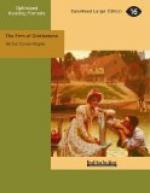The crowd was most dense and most noisy in front of the class-room in which the counting of the votes was going forward. At one the result was to be announced, and as the long hand of the great clock crept towards the hour, a hush of expectation fell upon the assembly. The brazen clang broke harshly out, and at the same moment the folding doors were flung open, and a knot of men rushed out into the crowd, who swirled and eddied round them. The centre of the throng was violently agitated, and the whole mass of people swayed outwards and inwards. For a minute or two the excited combatants seethed and struggled without a clue as to the cause of the commotion. Then the corner of a large placard was elevated above the heads of the rioters, on which was visible the word “Liberal” in great letters, but before it could be raised further it was torn down, and the struggle became fiercer than ever. Up came the placard again—the other corner this time—with the word “Majority” upon it, and then immediately vanished as before. Enough had been seen, however, to show which way the victory had gone, and shouts of triumph arose everywhere, with waving of hats and clatter of sticks. Meanwhile, in the centre the two parties fought round the placard, and the commotion began to cover a wider area, as either side was reinforced by fresh supporters. One gigantic Liberal seized the board, and held it aloft for a moment, so that it could be seen in its entirety by the whole multitude:
LIBERAL MAJORITY,
241.
But his triumph was short-lived. A stick descended upon his head, his heels were tripped up, and he and his placard rolled upon the ground together. The victors succeeded, however, in forcing their way to the extreme end of the quadrangle, where, as every Edinburgh man knows, the full-length statue of Sir David Brewster looks down upon the classic ground which he loved so well. An audacious Radical swarmed up upon the pedestal and balanced the obnoxious notice on the marble arms of the professor. Thus converted into a political partisan, the revered inventor of the kaleidoscope became the centre of a furious struggle, the vanquished politicians making the most desperate efforts to destroy the symbol of their opponents’ victory, while the others offered an equally vigorous resistance to their attacks. The struggle was still proceeding when Dimsdale removed his father, for it was impossible to say what form the riot might assume.
“What Goths! what barbarians!” cried the little doctor, as they walked down the Bridges. “And this is my dream of refined quiet and studious repose!”
“They are not always like that, sir,” said his son apologetically. “They were certainly a little jolly to-day.”
“A little jolly!” cried the doctor. “You rogue, Tom. I believe if I had not been there you would have been their ringleader.”
He glanced from one to the other, and it was so evident from the expression of their faces that he had just hit the mark, that he burst into a great guffaw of laughter, in which, after a moment’s hesitation, his two young companions heartily joined.




